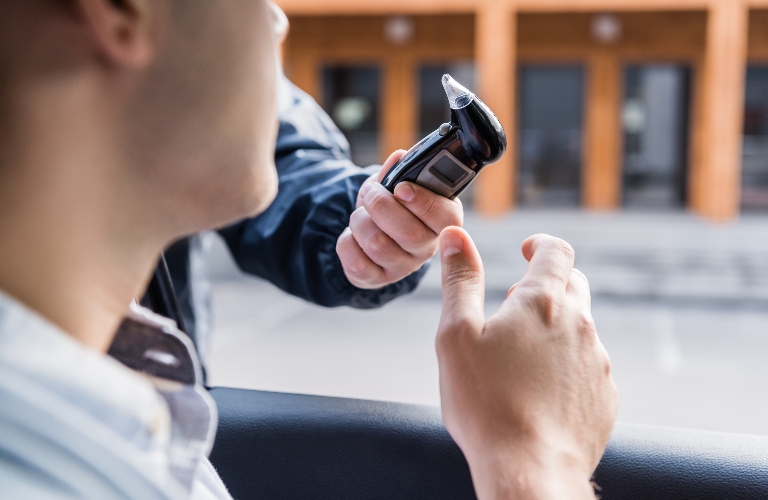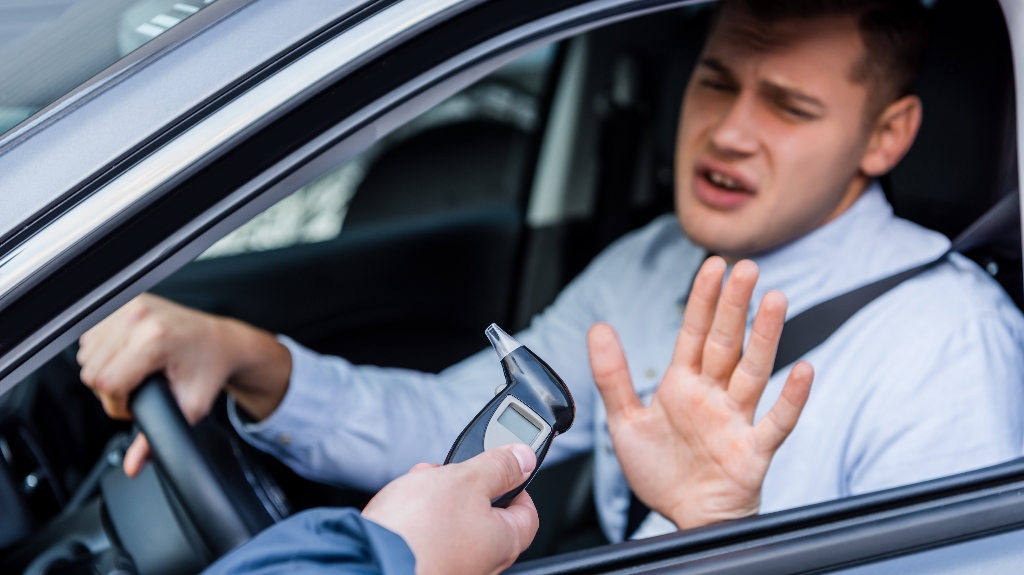If you are pulled over due to suspected drunk driving, you might be asked for a breath sample. There are a lot of misconceptions about your rights and what these tests actually involve, and believing the wrong information can make things worse, especially if you’re facing DUI charges in Illinois.
At Fabbrini Law Group, LLC, our Illinois DUI defense lawyers ensure that clients understand every aspect of their drunk driving cases because we feel that informed clients make better decisions about their cases. If you have questions or would like to speak with a lawyer about a drunk driving charge in Illinois, call us today to schedule your case review.
What is a Breath Test?
Police officers use breath tests after arrests and in roadside testing to prove whether or not a suspected drunk driver was operating a motor vehicle while under the influence of alcohol. These tests are used for operators of trucks and cars as well as operators of boats, motorcycles, and other vehicles, as defined by the state.
There are two different types of breath tests: the preliminary alcohol screening and the breathalyzer. Both of these are usually referred to as simply “breath tests,” which is why there is so much confusion surrounding the subject. In reality, they’re not the same; each is used at a different stage and serves a distinct purpose.
Common Issues with Illinois Breath Tests
Breath tests that rely on portable machines are notoriously unreliable and, as a result, are not usually admissible in court, but breath tests that use breathalyzers at police stations are. They can, however, be equally unreliable and, in certain circumstances, may also be inadmissible.
Breathalyzer issues generally fall into three main categories: problems with the testing device itself, errors made by the person administering the test, or issues with the sample provided.
Common Problems with Breathalyzer Devices
- Poor maintenance or damage: If a Breathalyzer hasn’t been properly cleaned, serviced, or repaired, it may give inaccurate readings.
- Improper calibration: These machines need regular calibration to stay accurate; just a small mistake can throw off the results.
- Faulty programming: Software glitches or outdated systems can lead to miscalculations of blood alcohol content.
- Incorrect chemical solutions: Using expired or improperly mixed chemicals can interfere with how the device measures alcohol levels.
- Unauthorized modifications: Any unapproved tweaks or adjustments to the machine can make the results unreliable or even invalid in court.
Common Issues During Breathalyzer Administration
- Untrained or inexperienced operators: If the person giving the test doesn’t know how to use the device correctly, the results can be way off.
- Failure to follow proper testing procedures: Skipping required steps, like waiting periods or observation times, can make a big difference in accuracy.
- Incorrect instructions to the driver: If the officer gives confusing or incomplete directions, it can affect the quality of the breath sample.
- Failure to caution when required: While a police caution doesn’t always apply to Breathalyzer testing, failing to advise someone of their rights at the right time can still cause legal complications down the road.
Common Causes of Inaccurate Breathalyzer Readings
- Residual alcohol in the mouth: Even small traces of alcohol from mouthwash, breath spray, or recent drinking can cause the device to register a higher BAC than it should.
- Medications, foods, or drinks: Some prescription drugs, over-the-counter medications, and even certain foods or beverages can interfere with Breathalyzer accuracy.
- Certain diets: Some low-carb diets can produce acetone in the breath, which some machines mistake for alcohol.
- Pre-existing or medical conditions: Health issues such as acid reflux, diabetes, or liver disease can affect how alcohol is processed, or create compounds that mimic alcohol on a breath test.
A breath test result isn’t always final. A skilled Illinois DUI defense lawyer can challenge its accuracy by filing a motion to suppress or a motion to exclude the evidence. If the court agrees that the test was dodgy or administered incorrectly, it could lead to the charges being reduced or even dropped.
How Can a DUI Breath Test Be Challenged?
In a lot of DUI cases, the breath test is the backbone of the prosecution’s evidence. That’s why it is so important to confirm that the test was conducted properly and the results are dependable. An experienced Illinois DUI defense lawyer will know how to find mistakes in interpretation, equipment maintenance, or testing procedures, and can take the right legal steps to suppress or challenge false positives.
At Fabbrini Law Group, LLC, we can take any of the actions listed below, depending on the specific facts of your Illinois DUI case:
How We Challenge Breath Test Evidence

- Questioning the test’s reliability: Breathalyzers are not infallible. Faulty machines, user error, and even health conditions can cause false positives, and we make sure the court knows it.
- Examining calibration procedures: To ensure they are accurate, Breathalyzers have to be calibrated by professionals. If the machine was not calibrated or maintained in accordance with Illinois law, the results could be invalid.
- Reviewing maintenance logs: Every breath test machine is supposed to be accompanied by a log that details when it was repaired, serviced, calibrated, and by whom. Missing or incomplete records can cast serious doubt on test reliability.
- Challenging operator training and performance: Officers must be properly trained and certified to administer these tests. If the test was mishandled or the officer wasn’t qualified, we’ll bring that to light.
- Reviewing documentation for inconsistencies: Accurate recordkeeping is essential for the state to prove a test’s validity. Gaps or errors in those records can weaken the prosecution’s case.
During the discovery phase of your Illinois drunk driving case, we will get the evidence and information needed to support arguments against the admissibility of the breath test.
Talk to an Illinois DUI defense lawyer Today
At Fabbrini Law Group, L.L.C., we know that a breath test can make or break a DUI case, but it isn’t always reliable. Our Illinois DUI defense lawyers carefully examine every detail surrounding your breath test, from the device’s calibration and maintenance records to the officer’s training and the testing conditions. If there’s any indication that your rights were violated or the test was improperly administered, we’ll fight to have that evidence thrown out.
If you’re facing DUI charges in Illinois, don’t assume the breath test results are final. Schedule a legal consultation by calling (312) 494-3131 or filling out our online contact form. We are committed to challenging dubious evidence and building the strongest possible defense on your behalf.


